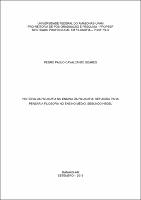| ???jsp.display-item.social.title??? |


|
Please use this identifier to cite or link to this item:
https://tede.ufam.edu.br/handle/tede/7514Full metadata record
| DC Field | Value | Language |
|---|---|---|
| dc.creator | Soares, Pedro Paulo Cavalcante | - |
| dc.creator.Lattes | http://lattes.cnpq.br/2585213838331875 | por |
| dc.contributor.advisor1 | Cornelli, Gabriele | - |
| dc.contributor.advisor1Lattes | http://lattes.cnpq.br/4547907128459717 | por |
| dc.contributor.referee1 | Gontijo, Pedro Ergnaldo | - |
| dc.contributor.referee1Lattes | http://lattes.cnpq.br/2496597365610298 | por |
| dc.contributor.referee2 | Costa, Deodato Ferreira da | - |
| dc.contributor.referee2Lattes | http://lattes.cnpq.br/1243908839023170 | por |
| dc.date.issued | 2019-09-26 | - |
| dc.identifier.citation | SOARES, Pedro Paulo Cavalcante. História da filosofia no ensino da filosofia: reflexão para pensar a filosofia no ensino médio, segundo Hegel. 2019. 137 f. Dissertação (Mestrado Profissional em Filosofia) - Universidade Federal do Amazonas, Manaus, 2019. | por |
| dc.identifier.uri | https://tede.ufam.edu.br/handle/tede/7514 | - |
| dc.description.resumo | É possível ensinar Filosofia no ensino médio sem recorrer à história da filosofia e aos seus conteúdos filosóficos? De acordo com o filósofo alemão G. W. F. Hegel (1770-1831), a resposta parece ser negativa. Para o filósofo, que parece ter sido o primeiro, depois de Aristóteles, a elaborar uma periodização da história da filosofia, os textos filosóficos da tradição produzidos ao longo de dois mil e seiscentos anos, apresentam o maior dos tesouros: o conhecimento racional. Além de imprescindíveis para se aprender Filosofia, não se distinguem do próprio filosofar, porque um não é sem o outro. Segundo Hegel, ao chegar-se a conhecer o conteúdo da filosofia, aprende-se não só a filosofar, mas já se filosofa efetivamente. Ainda que o filósofo não tenha dedicado nenhuma obra de caráter eminentemente pedagógico ao ensino da Filosofia, não se eximiu de dar a sua contribuição nesse sentido, especialmente quando ocupou o cargo de diretor do Ginásio de Nuremberg, ocasião em que buscou viabilizar diretrizes e procedimentos para o referido ensino aos jovens estudantes daquela instituição. Com Hegel, a história da filosofia ganha um tratamento científico e o estatuto de disciplina filosófica. Destarte, queremos compreender de que forma as reflexões filosóficas de Hegel acerca da história da filosofia podem ser utilizadas no ensino da Filosofia com a finalidade de propor estratégias didático-filosóficas a serem aplicadas na transmissão dos conteúdos filosóficos do ensino médio. Palavras-chave: Filosofia; história da filosofia; ensino; Hegel. | por |
| dc.description.abstract | Is it possible to teach philosophy in high school without resorting to the history of philosophy and its philosophical contents? According to the German philosopher G. W. F. Hegel (1770-1831), the answer seems to be negative. To the philosopher, who seems to have been the first, after Aristotle, to elaborate a periodization of the history of philosophy, the philosophical texts of tradition produced over two thousand and six hundred years represent the greatest of treasures: rational knowledge. In addition to being essential for learning philosophy, they are no different from philosophizing itself, because one is not without the other. According to Hegel, by getting to know the content of philosophy, one not only learns to philosophize, but already effectively philosophies. Although the philosopher did not dedicate any eminently pedagogical work to the teaching of philosophy, he did not hesitate to make his contribution in this regard, especially when he held the position of director of the Nuremberg Gymnasium, when he sought to make possible guidelines and procedures for said teaching to the young students of that institution. With Hegel, the history of philosophy gains scientific treatment and the status of philosophical discipline. Thus, we want to understand how Hegel's philosophical reflections on the history of philosophy can be used in the teaching of philosophy in order to propose didactic-philosophical strategies to be applied in the transmission of philosophical contents to high school students. Keywords: Philosophy; history of philosophy; teaching; Hegel | eng |
| dc.format | application/pdf | * |
| dc.thumbnail.url | https://tede.ufam.edu.br//retrieve/35465/Disserta%c3%a7%c3%a3o_PedroPauloSoares_PPGFILO.pdf.jpg | * |
| dc.language | por | por |
| dc.publisher | Universidade Federal do Amazonas | por |
| dc.publisher.department | Instituto de Filosofia, Ciências Humanas e Sociais | por |
| dc.publisher.country | Brasil | por |
| dc.publisher.initials | UFAM | por |
| dc.publisher.program | Programa de Pós-graduação em Filosofia | por |
| dc.rights | Acesso Aberto | por |
| dc.rights.uri | http://creativecommons.org/licenses/by-nc-nd/4.0/ | - |
| dc.subject | Filosofia - Estudo e ensino | por |
| dc.subject | História - Filosofia | por |
| dc.subject | Hegel, Georg Wilhelm Friedrich, 1770-1831 | por |
| dc.subject.cnpq | CIÊNCIAS HUMANAS | por |
| dc.title | História da filosofia no ensino da filosofia: reflexão para pensar a filosofia no ensino médio, segundo Hegel | por |
| dc.type | Dissertação | por |
| dc.subject.user | Filosofia | por |
| dc.subject.user | História da filosofia | por |
| dc.subject.user | Ensino | por |
| dc.subject.user | Hegel | por |
| Appears in Collections: | Mestrado Profissional em Filosofia | |
Files in This Item:
| File | Description | Size | Format | |
|---|---|---|---|---|
| Dissertação_PedroPauloSoares_PPGFILO.pdf | 1.2 MB | Adobe PDF |  Download/Open Preview |
This item is licensed under a Creative Commons License





